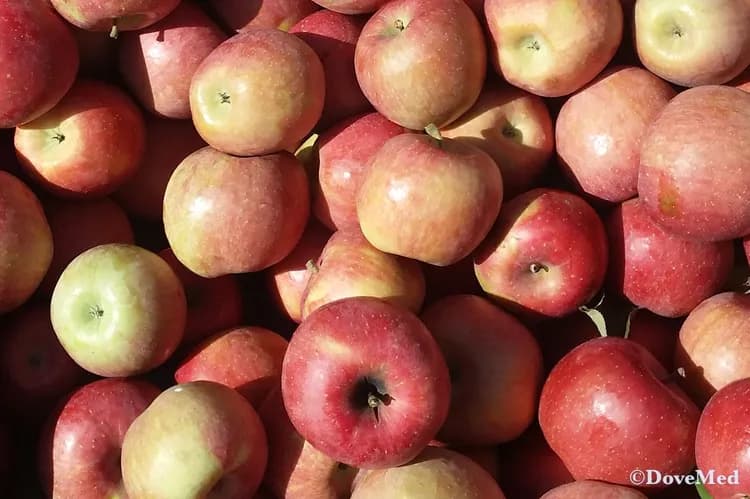The apple is a fruit from the apple tree (Malus domestica). The tree has been nurtured in Central Asia and Europe for thousands of years, but was then transported to North America by European colonialists. There are more than 7,500 different types of apple, and most are eaten raw or used for cooking and cider production. This delightful fruit is rich in color and comes in a variety of shapes and sizes.
The apple fruit is either oval or pear in shape. Its outer peel has different colors depending upon the cultivar type such as golden, green, and red. It is great to note that the common saying, “An apple a day keeps the doctor away,” is very true considering the significant health benefits and nutritional value of apples.
Apples are easy to digest, as they possess a large amount of fiber. One small apple has 4 grams of dietary fiber. Fiber stimulates the peristaltic motion and increases excretion of stomach juices, which facilities digestion, prevents disorders, like constipation, and protects the body from more severe health conditions like colorectal cancer.
A high fiber diet can also prevent spikes and crashes in blood sugar levels. Apples have a low glycemic index score. The glycemic index (GI) score rates food and drinks based on the ability that the food item has on increasing blood sugar. Foods high on the glycemic index, such as white rice, will break down effortlessly and cause blood sugar and insulin level spikes after meals, which are followed by rapidly dipping blood sugar levels. The sugar from apples is slowly absorbed into the bloodstream, which prevents sugar plummets, sugar longings, and mood swings. Unstable sugar levels can be fatal in some cases for diabetics.
Fiber in apples can also scrape cholesterol out of the arteries and blood vessels. In this manner, apples can help boost heart health. Moreover, apples are good at decreasing cholesterol levels in the body. The antioxidant activity can reduce the oxidation of fats, counteract triglycerides, and burn fat found in the blood vessels. Also, the skin of the apple contains an antioxidant, called quercetin. This antioxidant can decrease inflammation in the blood vessels, and thus, benefit the heart.
Another health benefit of eating apples is that they contain high levels of other antioxidants like polyphenols, phytochemicals, and anthocyanins. Research from the Current Opinion in Lipidology advised that these compounds may aid in fighting against heart disease, asthma, and diabetes. Also, regular consumption of apples per day may reduce the risk of lung and colon cancer.
Another health benefit of apples is that they can help improve dental hygiene by promoting cleaner teeth and gums. In addition, they have antibacterial properties that keep bacteria out of the mouth by stimulating saliva secretion. This basic compound reduces the ability of bacteria to grow and thrive in the mouth. Hence, eating an apple can protect one’s teeth too, apart from providing a host of health benefits.
Additional Resources:
Anderson, J. W., Baird, P., Davis Jr, R. H., Ferreri, S., Knudtson, M., Koraym, A., ... & Williams, C. L. (2009). Health benefits of dietary fiber. Nutrition reviews, 67(4), 188-205.
Gerhauser, C. (2008). Cancer chemopreventive potential of apples, apple juice, and apple components. Energy (kcal/kJ), 54, 227.
Knekt, P., Isotupa, S., Rissanen, H., Heliövaara, M., Järvinen, R., Häkkinen, S., ... & Reunanen, A. (2000). Quercetin intake and the incidence of cerebrovascular disease. European journal of clinical nutrition, 54(5), 415-417.
Manach, C., Mazur, A., & Scalbert, A. (2005). Polyphenols and prevention of cardiovascular diseases. Current opinion in lipidology, 16(1), 77-84.
Perry, A., Rasmussen, H., & Johnson, E. J. (2009). Xanthophyll (lutein, zeaxanthin) content in fruits, vegetables and corn and egg products. Journal of Food Composition and Analysis, 22(1), 9-15.
Stopar, M., Bolcina, U., Vanzo, A., & Vrhovsek, U. (2002). Lower crop load for cv. Jonagold apples (Malus× domestica Borkh.) increases polyphenol content and fruit quality. Journal of agricultural and food chemistry, 50(6), 1643-1646.
Wongkhantee, S., Patanapiradej, V., Maneenut, C., & Tantbirojn, D. (2006). Effect of acidic food and drinks on surface hardness of enamel, dentine, and tooth-coloured filling materials. Journal of Dentistry, 34(3), 214-220.
Helpful Peer-Reviewed Medical Articles:
Boyer, J., & Liu, R. H. (2004). Apple phytochemicals and their health benefits. Nutrition journal, 3(1), 1.He, X., & Liu, R. H. (2007). Triterpenoids isolated from apple peels have potent antiproliferative activity and may be partially responsible for apple's anticancer activity. Journal of agricultural and food chemistry, 55(11), 4366-4370.1). A comprehensive review of apples and apple components and their relationship to human health. Advances in Nutrition: An International Review Journal, 2(5), 408-420.
Adyanthaya, I., KWON, Y. I., Apostolidis, E., & Shetty, K. (2010). Health benefits of apple phenolics from postharvest stages for potential type 2 diabetes management using in vitro models. Journal of food Biochemistry,34(1), 31-49.
Liu, R. H. (2003). Health benefits of fruit and vegetables are from additive and synergistic combinations of phytochemicals. The American journal of clinical nutrition, 78(3), 517S-520S.
He, X., & Liu, R. H. (2007). Triterpenoids isolated from apple peels have potent antiproliferative activity and may be partially responsible for apple's anticancer activity. Journal of agricultural and food chemistry, 55(11), 4366-4370.
Wolfe, K., Wu, X., & Liu, R. H. (2003). Antioxidant activity of apple peels.Journal of agricultural and food chemistry, 51(3), 609-614.
Related Articles
Test Your Knowledge
Asked by users
Related Centers
Related Specialties
Related Physicians
Related Procedures
Related Resources
Join DoveHubs
and connect with fellow professionals


0 Comments
Please log in to post a comment.